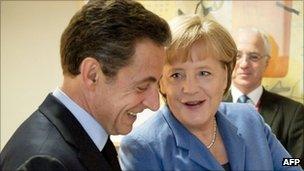Merkel urges euro fiscal union to tackle debt crisis
- Published
- comments

Mr Sarkozy and Mrs Merkel have been trying to reassure markets about the single currency
German Chancellor Angela Merkel has said Europe is working towards setting up a "fiscal union", in a bid to resolve the eurozone's debt crisis.
She told the Bundestag that a new EU treaty was needed to set up such a union and impose budget discipline.
On Monday she is to meet French President Nicolas Sarkozy, who has also called for EU treaty changes.
EU leaders have been under pressure to do more to tackle the debt crisis, amid concern about the survival of the euro.
In her speech, Mrs Merkel promised "concrete steps towards a fiscal union" - in effect close integration of the tax-and-spend polices of individual eurozone countries, with Brussels imposing penalties on members that break the rules.
"We need budget discipline and an effective crisis management mechanism," she said. "So we need to change the treaties or create new treaties."
The German government has been pressing for changes to establish powers to veto national budgets in the eurozone that breach agreed rules.
"We have started a new phase in European integration," Mrs Merkel said.
But she made it clear that this was a long-term process that would take years.
On Thursday, Mr Sarkozy said a new European treaty governing relations between members was necessary to protect Europe's place in the world.
"We must confront those who doubt the stability of the euro and speculate on its break-up with total solidarity," Mr Sarkozy said.
Mr Sarkozy said the euro could not continue to exist unless eurozone economies pulled together, with France and Germany playing a key role to ensure "a zone of stability".
However, Mr Sarkozy rejected suggestions that national budgets could be approved and regulated in Brussels, and said France would not give up its sovereignty.
No 'joint liability'
In her speech on Friday, Mrs Merkel also reiterated her opposition to the European Central Bank (ECB) issuing "eurobonds" backed by all eurozone members.
"A joint liability for others' debts is not acceptable," she said. "Eurobonds are not a rescue measure in this crisis."
She added: "National responsibility and European solidarity serve each other."
Many in Germany argue that eurobonds would penalise countries with a high credit rating, and reduce the incentive of indebted governments to reform.
Analysts also say Berlin is opposed to wholesale intervention by the ECB because of the country's experience of hyperinflation in the 1920s.
However, Germany's Sueddeutsche Zeitung daily said Mrs Merkel was willing to see the ECB step up its buying of bonds from indebted eurozone countries, as a bridging solution until budget controls took hold.
The BBC's Hugh Schofield in Paris says the outlines of a plan are beginning to take shape. There will be some form of overarching supervision of national budgets, as the Germans want - and in return, to satisfy the French, some loosening of the ECB's rules.
The problem, our correspondent adds, is that there is still no detail - it is unclear how budgetary discipline will be enforced, and whether countries that are not in the eurozone will be relegated to a European second zone.
During their meeting in Paris on Monday, Mr Sarkozy and Mrs Merkel are to agree on joint proposals to be put to a meeting of European leaders next week.
Many analysts see that summit as a crucial moment in efforts to tackle the debt crisis.
European stock markets rose early on Friday, as Europe's leaders called for closer economic integration as the way to resolve the debt crisis.
Meanwhile, Mr Sarkozy has been discussing the eurozone crisis with UK Prime Minister David Cameron in Paris.
Britain is concerned about the possible impact of a two-speed Europe, in which it could be left on the margins along with other countries outside the euro.